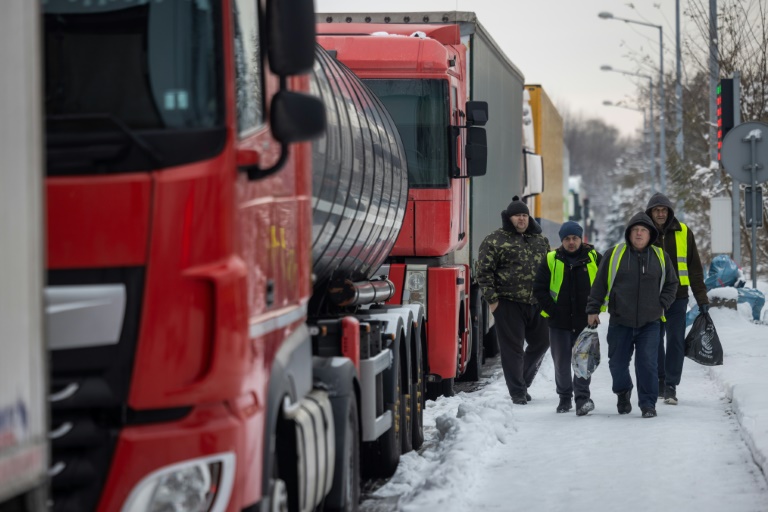Ukrainian truckers stranded in Poland battle cold

Ukrainian truckers are stuck as Polish hauliers block the border
Korczowa – In a Polish car park near the Ukrainian border, truck drivers stranded by a month-long blockade that has caused disruption and a row with Ukraine shoveled snow off their vehicles.
Around 100 truckers have been stuck in Korczowa, one of the crossings blocked by protesting Polish hauliers who complain about what they say is unfair competition from Ukrainian companies.
“This is our life now,” Yurii, a 56-year-old Ukrainian trucker, told AFP.
Yurii, who declined to give his surname, is carrying cargo headed for Kyiv and has been camped out at the parking lot for seven days.
“I didn’t expect to be stuck here this long, all our supplies are running out. Thank God there’s still water, but if it gets even more frosty, there will be no water at all,” Yurii said.
Polish transport business owners launched blockades at the Ukrainian border in early November, demanding the reinstatement of a system of entry permits to the European Union for Ukrainian trucks.
The permits were waived after Russia’s full-scale 2022 invasion of Ukraine to ease the cargo traffic in and out the war-torn country.
Negotiations between Poland, Ukraine and the EU so far have failed to resolve the dispute and the stalemate continues, with hundreds of truckers waiting at the checkpoints.
– ‘Use supplies sparingly’ –
“Around here, every driver would tell you more or less the same: the politicians can’t find a solution, and we are merely instruments in their hands,” Roman, a truck driver, said as he waited in Korczowa.
The 45-year-old Ukrainian is in charge of managing the makeshift queueing system the Ukrainian truckers created to improve traffic flow.
The Polish truckers who block the Korczowa checkpoint are now letting seven trucks per hour cross into Ukraine — and the Ukrainians started to distribute paper-made queueing numbers among themselves to know when their turn to cross comes.
Roman, who only provided his first name, said he was already the fifth person responsible for managing the queueing system — which included a notebook with records of vehicle numbers and a group chat on a messaging app.
“Those who waited the longest, for 13, 14 days, have already left,” Roman told AFP, “It’s going much faster now, around 50-60 trucks pass per day”.
But if nothing breaks the impasse, that still means around a week and half of waiting ahead for truckers now reaching Korczowa.
Igor, a 68-year-old trucker from Lviv, was driving frozen fish from Lithuania to Kyiv when the protest at the border forced him to stop in Korczowa — where he has been stuck for six days.
Boiling a pot of water on a camp stove inside his cockpit, Igor said he expected to spend at least three more days at the border.
“I use (food and water) supplies sparingly, because we don’t know for sure how much waiting there is,” Igor said.
– ‘Getting by somehow’ –
A dozen truckers gathered around a brazier at the entry of the Korczowa parking lot where a small van with Polish volunteers handing out free warm meals, bread and bottled water showed up.
The truckers grabbed bowls with sour rye soup, around 5,000 of which are distributed daily by World Central Kitchen at the blocked checkpoints in Poland.
Helping out in Korczowa was 39-year-old Serhii Vanat who had driven to the border from Wroclaw, over 500 kilometres (310 miles) west, to help out the Ukrainian truckers.
“It’s helping in getting on with the police, to call the local authorities, to bring wood for heating or water,” Vanat told AFP.
“We’re getting by somehow… there’s just no proper toilet, no place to take care of hygiene,” he said.
To Yurii, the lack of sanitary facilities is most acute — but he also worries about colder temperatures and running out of money.
Asked about the protest, he said it was detrimental to Ukraine’s efforts to defend itself.
“Poles always really helped (Ukraine) in the first days of the war,” Igor said.
“But here? We think it is just some kind of Russian propaganda.”
